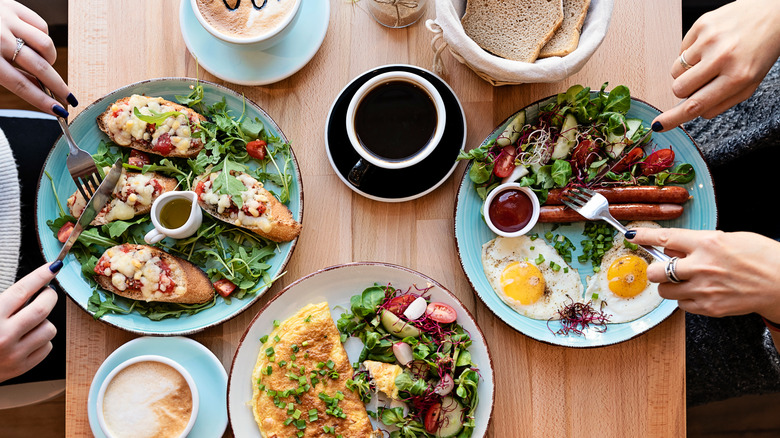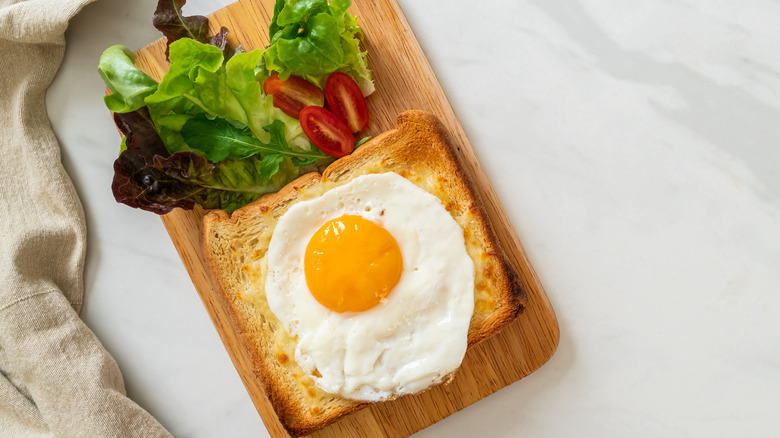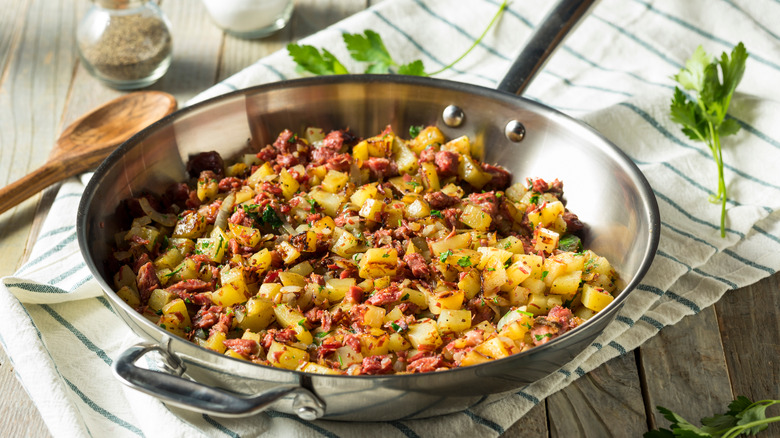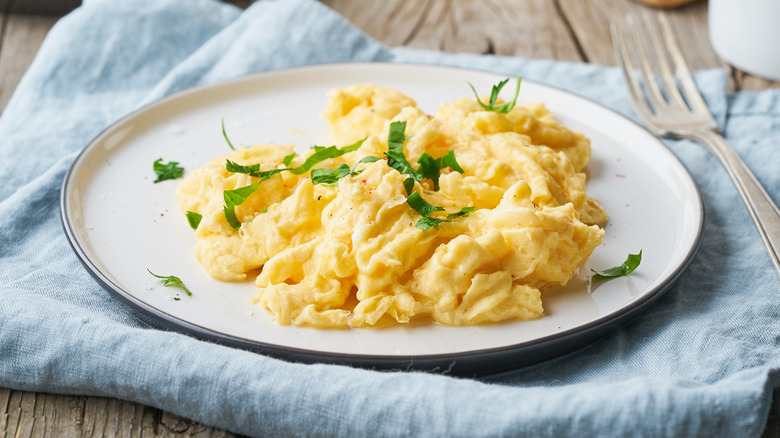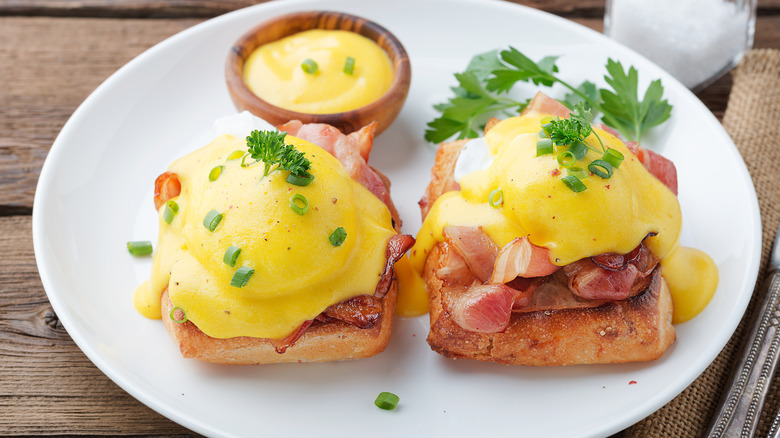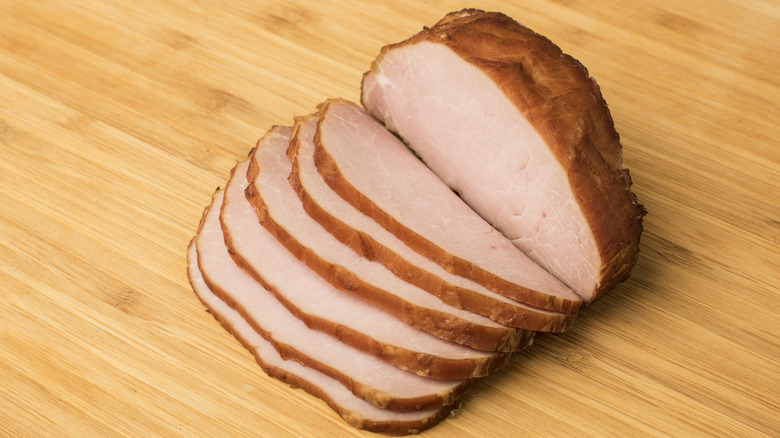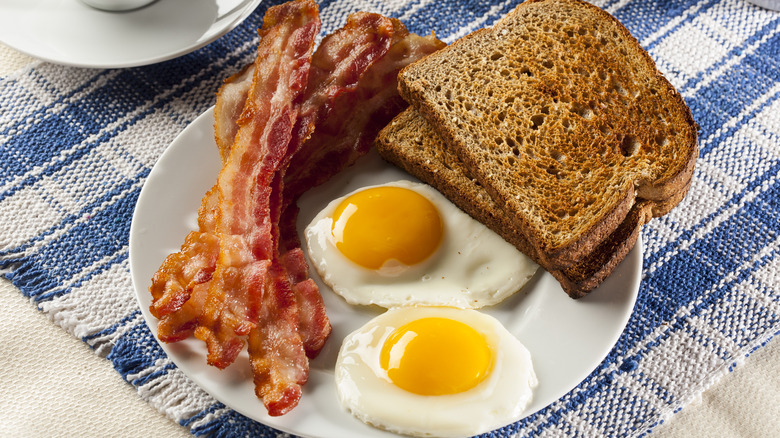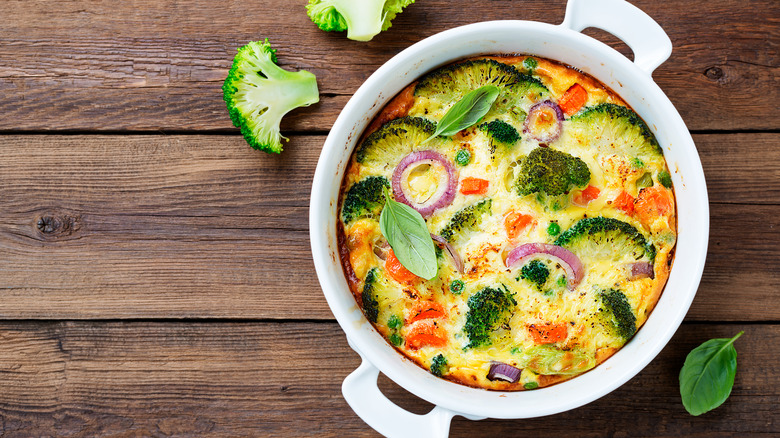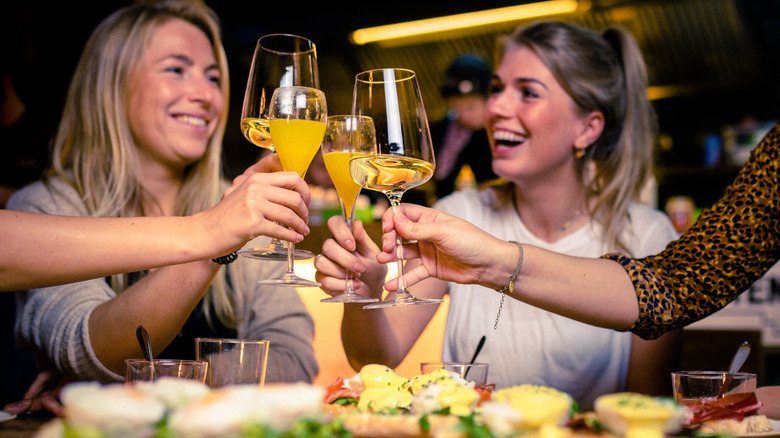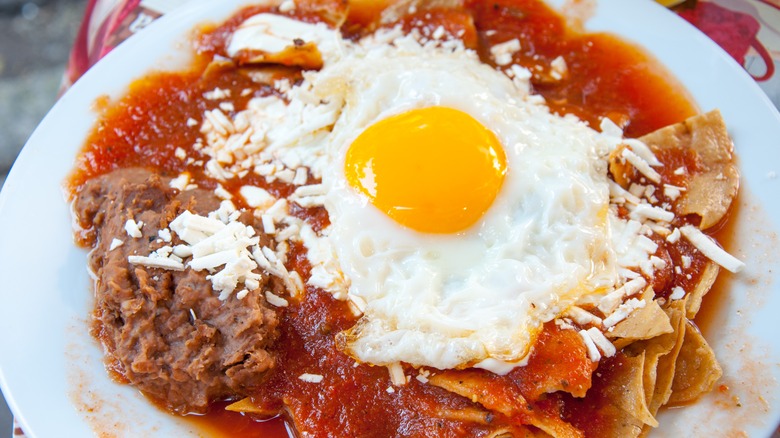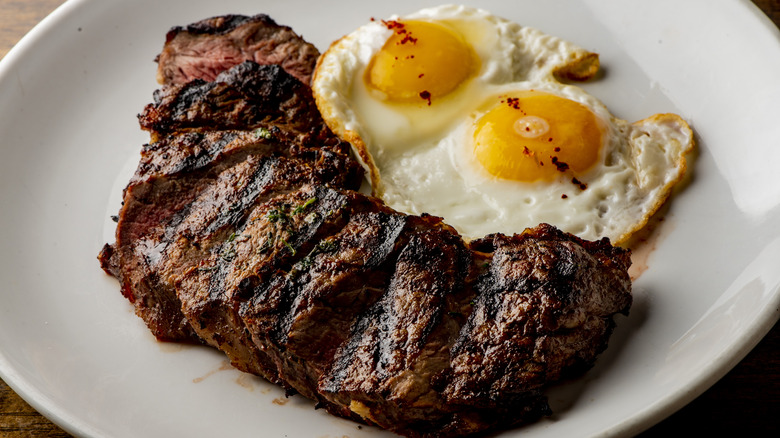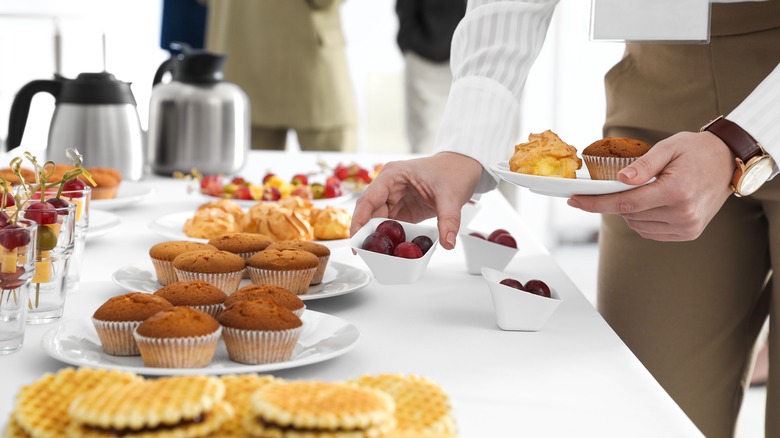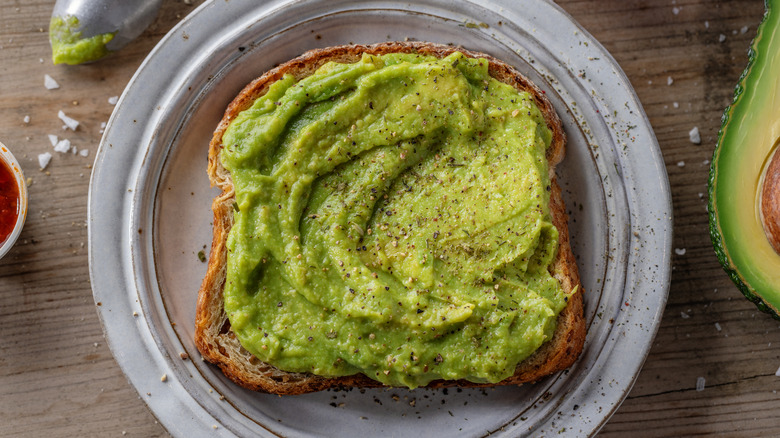The Worst Brunch Foods To Order, According To Chefs
If you want to know which brunch foods to avoid, just ask a chef. Most breakfast menus are a variation on a theme of eggs, breakfast meats, sweet pastries, and fried potatoes. At brunch, those dishes get jazzed up and served with the latest frou-frou mimosas. You can bet that chefs are rolling their eyes in the kitchen when customers order certain items. As much as you like eating brunch out on a lazy weekend day, it's not always the treat you expect.
Anthony Bourdain revealed that chefs notoriously hate brunch because it's a "horrible, cynical way of unloading leftovers and charging three times as much as you ordinarily charge for breakfast" (via The Oregonian). Some of the worst brunch foods to order could have easily been made at home or ordered from the local diner for far less. For example, today's corned beef hash and frittata may contain ingredients from a previous special that nobody ordered. And that expensive bowl of grits probably doesn't taste much better than a cheap pre-flavored packet.
If you want a nice brunch experience where you feel like you're getting your money's worth from inflated brunch prices, the trick is knowing what to avoid. We're revealing all the brunch items that chefs say you shouldn't order, if you don't want your meal to end in disappointment.
Foods you can make at home
If you can easily and cheaply make scrambled eggs, toast, and oatmeal at home, why are you ordering these items when you go out to brunch? Take oatmeal, for example. Chef and cooking show host Natasha Feldman points out that you may end up paying $10 for brunch oatmeal when the ingredients only cost the restaurant around 30 cents. Plus, most restaurants don't even make an effort with the dish, preparing it with water instead of milk (via Insider).
A Chicago pastry chef told Thrillist that most brunch foods contain cheap ingredients like eggs, flour, and butter, which means they're marked up around 20 times. Twitter user Tiffancynyc comments that customers tend to be more demanding when it comes to simple, boring breakfast items, probably because they "expect it their special way." If that's the case, why not make it in your kitchen the way you like it?
If you go out for brunch, try ordering something you haven't quite mastered, like pancakes. Or, if you're a creature of habit and only like foods you can make at home, Feldman suggests ordering a griddle meal. She points out that the various elements of the dish are standard but you'll get a lot out of it, generally making it "a good value for the price."
Corned beef hash
Everyone has a different idea of the ideal corned beef hash recipe, so the dish lends itself to lots of mistakes. On the ChefTalk forum, one professional cook writes that corned beef hash is a popular brunch menu item. In his experience though, many people complain when they discover it isn't the canned version they were expecting.
Meanwhile, when restaurants make it from scratch, the risk is that the corned beef hash is full of leftovers. Retired chef Chefbuba writes about getting a "prime rib hash" from a local brunch spot, only to find that it contained chopped-up leftover pieces of prime rib, leftover baked potato, and fajita vegetables. He was not shy about sending it back to the kitchen in disdain.
Capecodchef, an owner of a breakfast and lunch place, writes that "[a] good hash should be your number one item." However, the same chef admits to throwing everything from squash to rutabaga into the dish, so you never know what you're going to get. As a hodge-podge preparation, it remains a dish that chefs don't recommend ordering.
Iron Chef Jehangir Mehta told Salon that he avoids corned beef hash because it was a food created during wartime to help stretch out a portion of beef, and people used to eat it because there wasn't much else available. He doesn't understand why anyone would order it nowadays when "there are plenty of delicious other options."
Scrambled eggs
Scrambled eggs are deceptively simple, but so many breakfast and brunch places make the most disappointing, tasteless version you've ever had. Cooks are also less likely to pay attention to the quality and focus on more complicated menu items. Cook Rachel Amiralian told Insider that "Good scrambled eggs depend very much on personal preference. Leaving them in the hands of a cook on a busy day will probably leave you disappointed."
Not taking the time to stir the eggs as they cook or leaving them in the hot pan when they're ready are common mistakes people make when cooking eggs. Even a chef who has mastered the art of scrambled eggs can find themselves too busy during a brunch rush to make them properly, ultimately committing grievous egg mistakes. These circumstances can cause even the best brunch restaurant to serve lackluster, overcooked eggs.
If a chef doesn't have time to beat the eggs immediately before adding them to the pan, Anthony Bourdain says the result is a "sort of, odd greying, stippling effect [that] you probably recognize from greasy spoons" (via YouTube). How about practicing the technique at home to perfect a fluffy plate of eggs?
Eggs Benedict
A typical eggs Benedict recipe contains a poached egg and Canadian bacon on an English muffin, topped with hollandaise sauce. Anthony Bourdain fans who have read "Kitchen Confidential" know never to order eggs Benedict for brunch. As a seasoned chef who worked in several brunch restaurant kitchens, Bourdain declared he'd never order anything on the menu with hollandaise sauce. His reasoning: "Bacteria love hollandaise. And nobody I know has ever made hollandaise to order" (via The Guardian).
Unlike egg-based mayonnaise and aioli, hollandaise sauce recipes typically begin with hot melted butter to help with the emulsion process. Chefs keep it warm rather than hot because it curdles and separates otherwise, commonly storing it in a thermos or water bath because they're usually too busy to make it on demand (via ChefTalk).
The problem is that the U.S. Food & Drug Administration (FDA) warns that cooked egg-based foods like hollandaise sauce should be kept at 135 F or above to remain safe. However, if chefs aren't keeping a watch on the temperature as time passes, the staple eggs Benedict sauce can become a bacterial breeding ground.
Canadian bacon
Anthony Bourdain points out in "Kitchen Confidential" that foods that only show up on brunch menus are more likely to go bad in the fridge. "How long has that Canadian bacon been festering in the walk-in?" he questions. "Remember, brunch is only served once a week — on the weekends" (via The Guardian). Ordinary bacon may make its way into other dishes throughout the week, but unless the restaurant has breakfast or pizza menu items with Canadian bacon, there's a chance it has been sitting around waiting for the next brunch service.
Healthline says the pork product is good for a month or two if frozen, but only fresh for three to four days if it's open in the fridge. Canadian bacon comes pre-cooked, which means that a chef isn't going to do more than warm it up (if that) before adding it to your plate. Not only is it likely you're getting last week's Canadian bacon, but there's less of a chance it will be sufficiently heated to kill the multiplying bacteria before it hits your plate.
Boring menu items you could get anywhere
It makes sense to go out for breakfast when you don't feel like cooking and eating at home yet again. However, if you're planning to get an ordinary plate of sausage, eggs, and grits, don't go to a place that serves brunch. Instead, go to a breakfast place where the food is cheaper. One pastry chef told Thrillist that brunch is when restaurants make the most money because they're able to mark up cheap ingredients to sell at hefty prices. She says that her boss at a fancy restaurant that sells $30 to $40 entrees sees brunch as a "bonus cash grab."
Since you're paying more for brunch, you should choose more unique and inventive dishes that make your meal special, rather than something you could get down at the local greasy spoon for a fraction of the price. We understand — sometimes, you just don't want to cook breakfast for yourself at home or have to clean up the mess. If that's the case and you're looking for a simple traditional breakfast, go somewhere cheap and fast like Waffle House or the neighborhood diner rather than a trendy expensive brunch spot.
Omelets and other dishes with extra ingredients
Anthony Bourdain exposes several restaurant kitchen secrets in "Kitchen Confidential," including the fact that "brunch menus are an open invitation to the cost-conscious chef, a dumping ground for the odd bits left over from Friday and Saturday nights" (via The Guardian). You might expect last week's veggies in Monday's soup, but it can make for some odd experiments at brunch.
Chef Rahul Sharma says it can be tricky to use the extras from the week in a novel fashion that satisfies diners (via Twitter). An anonymous New York City chef explained this brunch phenomenon to Thrillist, using baby turnips from the farmers market as an example. If they aren't used up by the end of the week, restaurants will lose money by tossing them out.
The strategy of using leftover ingredients for brunch makes a lot of business sense, and it can even result in excellent brunch inventions. However, it can also lead to a horrible brunch experience. If you don't want to risk getting Wednesday's turnips in your Sunday brunch omelet or frittata, avoid brunch items with names that sound a little dicey, because they just might be. Your "garbage can omelet" may contain ingredients that truly would be better off in the trash.
Bottomless breakfast cocktails
Drinking Bloody Marys and mimosas can sometimes be the main objective of brunch since it's a socially-acceptable excuse to day drink. However, any place that offers bottomless mimosas and Bloody Marys should be a little suspicious. If a restaurant allows you to drink all you can, it's likely making its drinks out of low-quality liquor. An anonymous New York City chef explained to Thrillist how restaurants get away with serving all-you-can-drink breakfast cocktails: "When I ran a bar, my average well liquor cost around $6 a bottle, and I could get 25 pours out of that. You can do the math there."
Cheap liquor typically leads to alcohol headaches and hangovers, since it's usually distilled less and may not be filtered (via Gizmodo). This means it's more likely to contain impurities we can't easily process. As a result, our bodies treat it as poison, which shows up physiologically as a headache or other hangover symptoms. Drinking too much bottomless booze can also lead to dehydration, which is also responsible for a bad headache or hangover.
Chilaquiles (unless you're in a Mexican restaurant)
Mexican dishes are always tempting brunch items, and finding chilaquiles on the menu can be an exciting prospect. When done right, this egg dish packs lots of flavor and texture. However, ordering a Mexican breakfast meal like chilaquiles is likely to leave you disappointed unless you're at a Mexican restaurant. Chef Natasha Feldman tells Insider that, in most brunch places, "the proportion of sauce to tortilla is never right. You'll end up with a sad, overpriced pile of chips."
Another reason chilaquiles aren't a great brunch dish to order is that the chips can get soggy fast if the cook doesn't know what they're doing. One trick to avoid soggy chilaquiles is to eat them as soon as they're ready. If the wait staff doesn't get them to your table immediately, they're likely to quickly get mushy.
The reason most non-Mexican restaurants fail at chilaquiles is that the chips aren't crunchy enough and soak up all the liquid from the toppings. A Mexican Redditor living in Mexico City wrote that it's important to use authentic tortillas to make the dish because they can better withstand being soaked in salsa.
Steak and eggs
Steak and eggs may sound like a good brunch idea, especially if you're looking for a high-protein, low-carb menu item. Unfortunately, chefs agree this is among the worst dishes to order. One of the main problems is that you often end up with a chewy lower-quality piece of beef rather than a tender quality cut.
Chef Trevor Kunk tells Insider that you should avoid steak and eggs for brunch unless you're sure you're getting good meat. He notes that if the price seems appropriate for a high-quality piece of meat or the establishment has a solid reputation, the dish should be successful.
The price of beef keeps increasing, so your steak and eggs should by no means cost the same as other egg-based menu items. While there are tricks to make cheap steaks taste expensive, don't count on it happening with an ordinary plate of steak and eggs at brunch.
Hotel brunch buffets
Hotel brunch buffets are rarely worth it, and while there are some decent exceptions, the food quality is often questionable. For example, hotel buffet scrambled eggs are commonly made from a powdered mix (via Express). A chef from Quebec, who helps other chefs design food programs like hotel brunches, shares that he doesn't eat eggs Benedict, scrambled eggs, greasy bacon, or pancakes from buffets because he's rarely satisfied with these dishes (via ChefTalk). Unfortunately, those all sound like common items at the average hotel brunch buffet.
Another chef dislikes the format at most business hotels, which he describes as nothing more than "a toaster on the counter in a small self-service dining room surrounded by packaged pastries, stale bagels, a bowl of fruit with cereal, milk, juice, and marginal coffee," (via ChefTalk). If there's any choice whatsoever, he opts for a made-to-order breakfast from the hotel restaurant rather than endure the brunch buffet.
After all, most breakfast foods don't take a lot of time to make. So, even if you're in a hurry to get moving to your next destination, it shouldn't take that much more time to wait for the chef to make your breakfast instead of chancing the hotel brunch buffet.
Avocado toast
Somehow, avocado toast has become the on-trend menu item to order for breakfast or brunch. For some, the mere mention of brunch conjures up an image of avocado toast. But is that really the indulgence you want at brunch prices? Avocado toast has been around since at least the 1990s on menus in Sydney, Australia (via Broadsheet). But various cooking blog incarnations in the 2000s and 2010s keep it evolving into a viral trendy must-eat.
Boston chef Tim Maslow doesn't advocate getting avocado toast if you're out for brunch or breakfast. He says, "I don't know why you would pay for an avocado toast at a restaurant. Just go buy good bread and buy an avocado and put the s*** together" (via Food Republic). In all fairness, he's absolutely right; there's nothing skilled about smashing an avocado onto a slice of bread.
Of course, there are exceptions. For example, if the avocado toast comes with a jammy egg on top, along with extras like charred corn, pickled vegetables, infused oils, and so on, it is sure to be a delectable brunch-worthy experience. But if the menu item indicates nothing special but avocado and toasted bread, you might as well make it at home and order something that will make your brunch a memorable dining experience.
